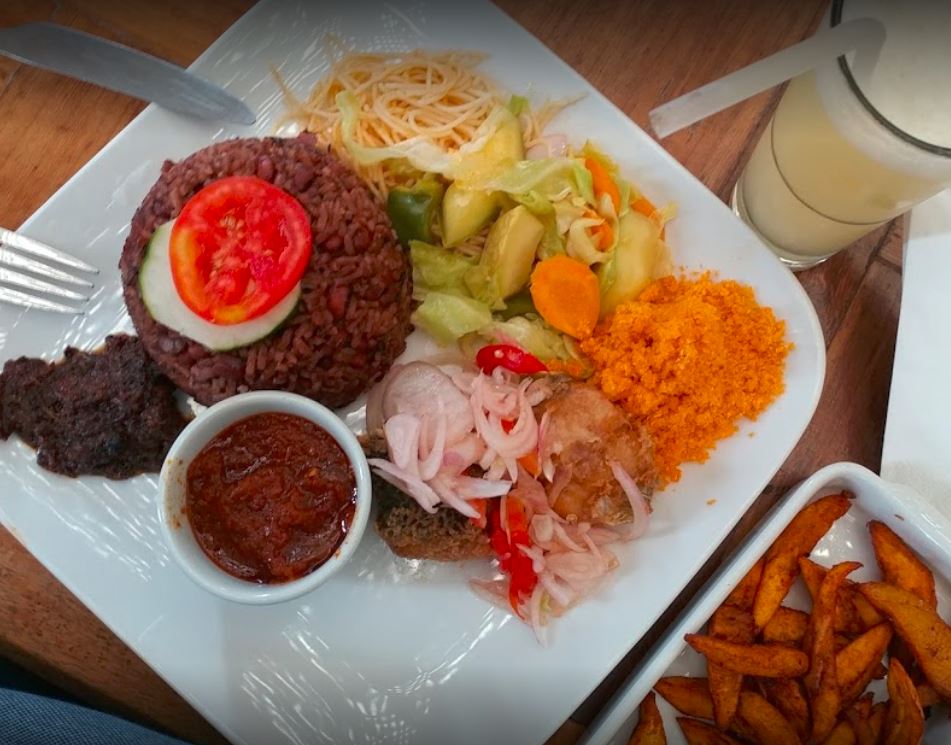

Egusi seeds can be added to soups and stews, or you can even extract the oil and use it for cooking.Īccording to Afolayan, egusi is BUKA’s most popular dish. But the seeds can also be pounded, roasted and turned into a paste that has a consistency comparable to peanut butter.

Egusi melon closely resembles a watermelon, but unlike a watermelon you can’t eat the pulp of egusi instead it’s harvested for its seeds.įor cooking, dehulled egusi melon seeds can be roasted and eaten right away. In addition to locust bean, Afolayan often cooks with egusi, a type of melon that grows widely in parts of West Africa. Gbegiri can be served by itself, but at BUKA it’s served with cornmeal fufu. In one of BUKA’s main plates, goat and tripe are cooked in the okra sauce with dried fish, dried shrimp and stock fish and served with fufu. Dawada is often found in soups and stews, it can also act as a handy meat substitute because of its flavor and nutritional properties.Īt BUKA, Afolayan uses locust bean in two of his sauces: okra sauce and gbegiri sauce (a traditional Nigerian soup made from crushed beans). The fermented material is said to smell like a really strong cheese. The seed’s most sought after product is dawadawa, an extract that comes from boiling, pounding and rendering down the seeds into sticky balls. During times of famine, they can provide a literal lifeline. The fruit that grows on locust trees contains pods filled with an orangey syrup that’s used as baby food and to sweeten drinks.īut the tree’s most coveted treasure is its seeds, which are found inside the pods and packed with minerals like calcium and iron. Neither an insect nor a bean, the West African locust is actually a tree that can grow up to 65 feet tall. One West African ingredient that Afolayan incorporates into his cooking is the locust bean. So he only uses real Nigerian spices and seasonings that his ancestors have been using for thousands of years. “If flavor is what you want, I’ll give you real flavor.”Īfolayan explained that Nigerian cuisine doesn’t have much colonial influence, which is why every ingredient that he works with is true to West African culture. “If come here what they have to know is that nothing is fake,” he says. The Nigerian chef attributes his success to telling the truth through food. Now, almost 12 years later, Afolayan’s restaurant continues its tradition of serving authentic West African food. “They would always ask me, ‘Lookman, when are you going to open a restaurant?’"Īfter leaving the store for nearly a decade to pursue other employment opportunities, Afolayan opened BUKA in 2009 and never looked back. “People were after my cooking,” he recalls. Shortly after being hired, he began cooking Nigerian food at the store and it became very popular. The Nigeria-born chef got his start working at a small grocery store in New York. “Whatever you get in my restaurant is what you’re going to get anywhere in West Africa or Nigeria.” “I focus solely on Nigerian food,” says Afolayan. The Brooklyn-based hot spot offers a cornucopia of Nigerian dishes and street food, from the menu’s West African land snails, also known as igbin, down to its most popular dish, egusi. But some true treasures of West African cuisine, like fufu and egusi (a type of melon seed) remained more elusive.Īfolayan is breaking down that knowledge barrier with his authentic West African restaurant. Enslaved African chefs also developed cooking methods for frying fish, grilling meat, stewing greens that are still used today.
Buka nigerian restaurant full#
When West Africans were forced into slavery in the Americas during the 16th century, they planted their own gardens full of fruits and vegetables native to Africa. As farming techniques spread across West Africa, people in Nigeria, Ghana, Liberia, Senegal and Sierra Leone grew a variety of crops like millet and sorghum that are now staples in West African cooking. West African cuisine’s use of unaltered ingredients stems from its farming history that dates back to 3000 BCE. Since some, like locust bean, alligator peppers and calabash nutmeg are still not readily available in the United States, Afolayan imports a few ingredients straight from West Africa himself. “If you cook freshly, the taste is very different from just cooking from a can.”Īt his restaurant, he estimates that 99% of the ingredients he cooks with are completely unprocessed. “It has to be fresh tomato, fresh pepper, fresh everything,” he explains. One of Afolayan’s favorite aspects of West African cooking is how natural and fresh the ingredients are.


Lookman Afolayan, chef and owner of BUKA in Brooklyn, New York.


 0 kommentar(er)
0 kommentar(er)
